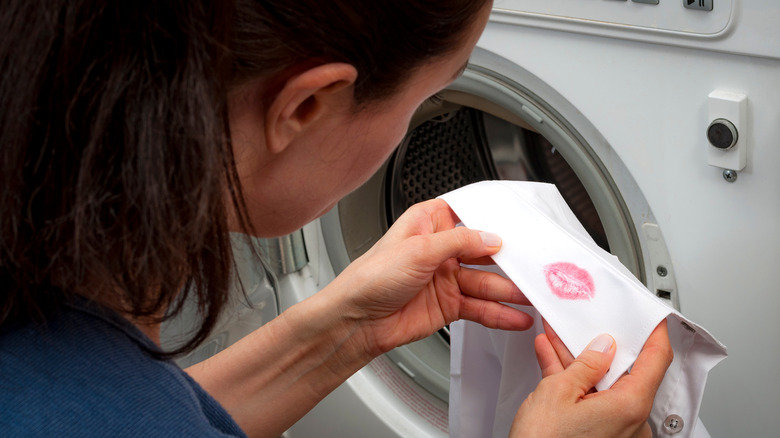How Marriage Therapists Know A Relationship Won't Last
Aside from you and your partner, there is perhaps no one better qualified to weigh in on the health of your relationship than a marriage therapist or couples counselor. As it happens, these experts may know your relationship even better than you do as they have the benefit of seeing things from an unbiased perspective. "There are three sides to every story: his side, her side and the truth," psychotherapist Kimberly Resnick Anderson explained to CNN. "An objective third party can be just the ticket when couples feel they can no longer communicate effectively."
Although marriage therapists and counselors' primary goal is to help you improve your relationship, that isn't always possible. Just as science has revealed certain risk factors that lead to divorce, marriage experts have started to piece together patterns from their years spent working with clients. With their unique fly-on-the-wall point of view combined with their knowledge and experience, they've become adept at knowing when even marriage counseling won't be enough. Here's some of the biggest red flags.
Grudge holding and a destructive fighting style
With over a decade of experience practicing marital therapy under her belt, licensed clinical social worker and marriage counselor Sherry Amatenstein admitted that she "can tell within 10 minutes if your relationship will last." In article she penned for PsyCom, she revealed two major indicators of a doomed relationship: a "destructive fighting style" and "grudge holding."
Fighting dirty — including engaging in screaming matches, showing disrespect and contempt, and choosing not to listen to your partner — is not exactly a sign of wanting to work things out. Equally toxic to a relationship is choosing not to let go of grudges. This can cause a lot of resentment and anger in both parties.
Couples who resolve to change these habits can successfully repair their marriage, but those unwilling to make the needed changes will likely see their marriage end in divorce. But even divorce doesn't get you off the hook from making adjustments. "Even if the union ultimately ends in divorce," the counselor revealed, "learning to curb a vengeful tongue will benefit you regardless."
The trust is broken
It may sound cliché, but trust is fundamental to all relationships — especially marriages. If the trust is broken in a marriage, the relationship is almost always also fragmented. And nothing kills trust — and relationships — faster than when one person cheats. "It breaks the trust in the relationship, and sometimes the breach is not fixable," Tina B. Tessina, psychotherapist and author of Money, Sex and Kids: Stop Fighting about the Three Things That Can Ruin Your Marriage, told Prevention.
The expert revealed that both the relationship and the trust can be repaired, but much of that depends on the person who broke the trust. That spouse has to be willing to become accountable and start telling the truth. Being willing to sacrifice some of their privacy — at least while the trust is slowly rebuilt — is also an important step to fixing the marriage. Without these changes, the relationship surely will not last.
Name-calling and finger-pointing
While trust is an undeniably important part of a relationship, there are still plenty of things that can come between spouses that have absolutely nothing to do with trust. Just as frequent screaming matches are all kinds of toxic to a relationship, so too are other quieter alternatives.
When speaking to Reader's Digest, one marriage counselor listed off three signs that a couple's relationship is, more or less, doomed. According to the expert, couples who resort to name-calling and finger-pointing are headed down a destructive path. No screaming required. The counselor also revealed that it's a big red flag when partners — and this could be one spouse or even both — refuse to accept their share of responsibility for the issues in the marriage. If you know a couple who constantly blames their other half for issues in their relationship, there's a good chance they've already purchased a oneway tickets to Splitsville.
The touching tell
"Touch is the building block of connection and intimacy in romantic relationships," Melissa Cohen, a couples therapist in Westfield, New Jersey, told Prevention. Although the expert confirmed that couples who are happily married are more affectionate overall, she revealed that a healthy relationship is not necessarily about "how often your partner touches you, but how often he or she touches you in response to your touch."
Likewise, if a couple frequently sits with their legs or arms crossed or position themselves with their back to their spouse, this indicates trouble, according to Carole Lieberman, a couples therapist in Beverly Hills, California and author of  Bad Boys: Why We Love Them, How to Live With Them, When to Leave Them. Even if the couple has an active sex life, this closed-off body language, as well as a lack of touch outside the realm of the bedroom, signal to therapists that divorce could be imminent.
There's a feeling of hopelessness
Couples therapist Rachel Sussman said relationships often fail when a person experiences a feeling of hopelessness. "When you're in a healthy relationship, it can throw a little sunshine on everything in your life," she told Business Insider. On the other hand, when a couple is venturing toward divorce territory, Sussman said they often "feel that there's nothing else that can be done to save the relationship."
It has also been the marriage expert's experience with her clients that this hopelessness doesn't just surround the relationship itself, but it spreads into the rest of a person's life as well. Once this feeling of hopelessness has set in, the spouse has essentially already thrown in the towel — at least mentally. With all hope of saving the relationship gone, it will likely just be a matter of time before a divorce is sought and the couple officially calls it quits.
Not enough crying?
If a spouse's default way of communicating is through screaming, that's obviously not an indicator of a healthy relationship. Nevertheless, a lack of emotion can actually be an even greater problem. "It means that they've gone past the point of hurt and have cut off all feelings toward one another," California-based couples therapist Carole Lieberman told Prevention. According to her, it's really a better sign when a couple comes into her office crying or yelling than if they walk in completely emotionless. "When someone acts as if they can't wait to get out of the session, they've already decided that therapy won't work and the relationship is over," the expert revealed.
If the stonewalling spouse isn't willing to open up and express some thoughts and emotions with their partner, psychotherapist Tina B. Tessina confirmed that "the relationship won't work" — that is, of course, unless that spouse makes the necessary changes.
One spouse is indifferent
One of the reasons a spouse may enter a therapy session void of emotion is because they're feeling indifferent about the relationship. Marriage and family therapist Hal Runkel told Business Insider, "When one spouse is indifferent, they no longer care that much about how their spouse feels and behaves." While one partner could be crying and pleading, the other might just be sitting, staring, and just generally not caring about what's happening in front of them. "They don't care that much about staying in a relationship at all, much less doing whatever it takes to make it work," the expert said of an indifferent spouse.
Naturally, this dynamic is not ideal for a successful marriage, but the marriage can be saved if both partners are willing to dedicate the time and effort needed. Nevertheless, if one spouse keeps on the current course of indifference, the relationship is destined for divorce.
Continuing an affair
If one spouse has an affair, the couple may try to repair their relationship on their own or by seeking the guidance of a marriage counselor or therapist. But what happens if the affair wasn't just a one time thing? What if, instead, it continues on even after the truth came out? According to psychotherapist Tina B. Tessina, any such involvements outside of the marriage can spell disaster.
Debra Macleod, a marriage expert, couples mediator, and author, revealed in an article for HuffPost that a spouse may think about "waiting it out." That is, seeing if their partner will end the affair on their own. Others may try to beg their spouse into ending the affair. But none of these are advised. According to the expert, "allowing an unfaithful spouse to continue in an affair — an allowance almost always made from a position of powerlessness and desperation — sets a dangerous precedent in the marriage, one that can lead to all kinds of unforeseen consequences down the road."
Once a cheater, always a cheater?
Even if a spouse carried on an affair for a time, that in itself may not ruin a marriage. Some couples are able to repair their relationship after infidelity. Though, the spouse who was cheated on might fear the familiar phrase "once a cheater, always a cheater." However, that's not set in stone.
"If either half of a couple has been untrue in the past or in a past relationship, chances are that it may happen again," Betsy Ross, a psychotherapist in Massachusetts told HuffPost. "No matter what the reason, having chosen to step over the 'fidelity line' once can make you more likely to do so again when times get tough." Still, if the couple can get to the bottom of why one spouse cheated, this might just mean that a repeat occurrence can be prevented and that there is some real hope for the marriage.
When the couple stops being buddies
When a couple first gets married, they may feel like they've married their best friend. After a while, though, some couples may realize that they don't have much in common anymore. Once upon a time, their conversations may have lasted hours, but now meals are consumed in silence or they're constantly off doing their own thing.
Melissa Cohen, a couples therapist in Westfield, New Jersey, told Prevention, "Sometimes I see a marked lack of affection, humor, active interest, excitement, or joy." On the outside, this may not seem so bad. After all, there's no yelling or name-calling. "Couples simply stop sharing their inner world with each other," she revealed to the publication. Regardless, Cohen said this is disastrous to a marriage. A lack of conversation — even heated arguments — obviously means there's a huge a lack of communication. When that happens, the relationship hits a stalemate and, if nothing changes, becomes unable to thrive.
There are no happy memories
A happily married person may display their favorite wedding photos around their home. On their anniversary, they might just reminisce about all the good times they've had together over the years. Spouses who are not happily married, however, tend to look back differently.
Caroline Madden, a marriage and family therapist and author of How to Go from Soul Mates to Roommates in 10 Easy Steps, told HuffPost that she asks all of her clients how they met and how they fell in love. She then gauges their reactions. She revealed, "It could be tears, laughter or even anger at why they aren't still that couple. What that tells me is if there still is a spark between them, that they remember that they were in love and want to be that couple again."
Sometimes, though, a spouse says they're unable to remember or names things they disliked about their partner from the get-go. Those couples aren't likely to go the distance. She explained, "I can rescue couples from the brink of divorce after an affair — I can't bring the spark back."
There's not enough space
The couple who chooses not to spend any time together isn't destined for marital success, but the couple who does everything together isn't either, as it turns out. When one spouse takes up all of the other's time, it can breed resentment. Both spouses can end up getting frustrated and angry with each other. Family therapist Jim Walkup said he's come to recognize a lack of space as one of the best indicators of divorce. A healthy and trusting relationship allows for togetherness and time apart.
According to a Psychology Today article by psychologist Rob Pascale and marriage counselor and psychologist Louis H. Primavera, "a mix of time with friends and family, time together as a couple, and separate time for each partner add to marital quality." A balance of time is vital in order for a marriage to be successful.
A power discrepancy is at play
It has been Arkansas-based marriage and family therapist Becky Whetsone's experience that couples who don't feel like equals end up calling it quits. When speaking to HuffPost, Whetsone explained, "Any sort of major power discrepancy between the two — she's old, he's young; she's educated, he's not; he's rich, she's poor; she's beautiful, he's not — can end up causing problems in a relationship."
There can even be an imbalance when it comes to how much each person cares, according to Kristin Davin, a psychologist in New York City. "If you find that you're always the one doing the [emotional] heavy lifting, it changes your relationship dynamic," the psychologist told HuffPost. "People become resentful. They experience inequality in the relationship and the heavy lifter feels like the relationship is more work than it should be." Both the psychologist and marriage therapist agree that this imbalance in power can lead to divorce.













